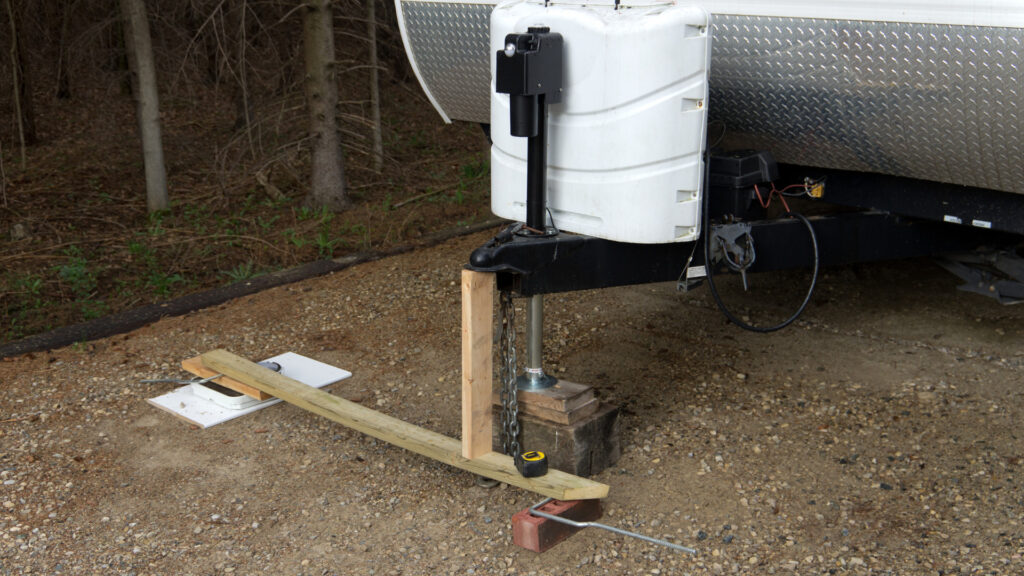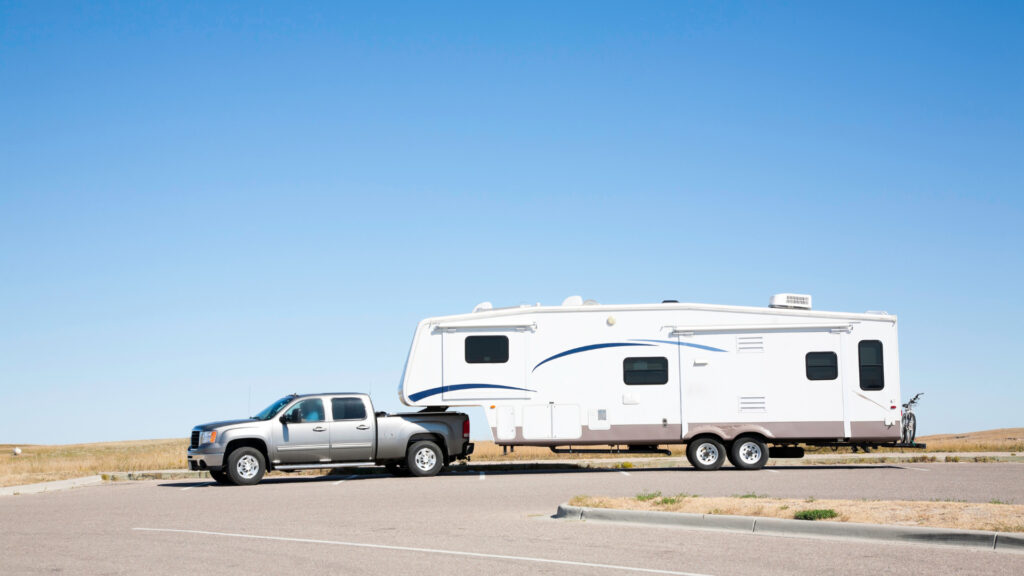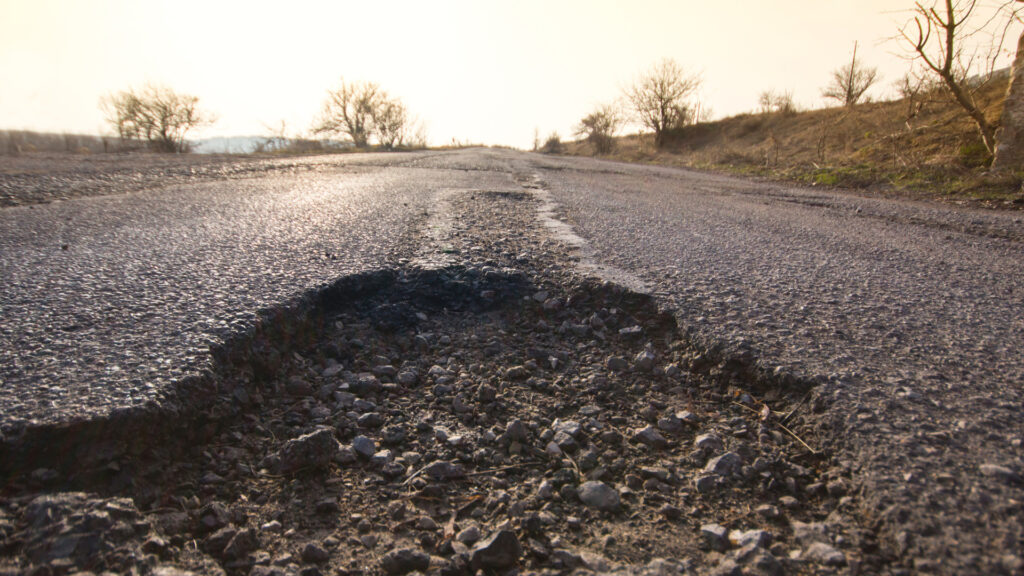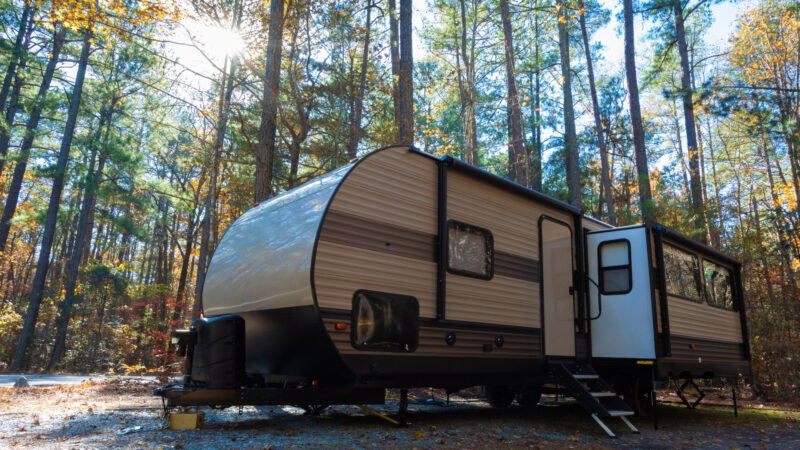Table of Contents Show
Like many, we’re guilty of mindlessly scrolling through social media occasionally. Recently, during one of those timeouts, a post caught our attention. We couldn’t believe what we saw.
The post was in a full-time RVing Facebook group and featured a picture of a severely bent A-frame on a travel trailer. We couldn’t resist diving into the 100-plus comments to see what happened.
So what happened to this RVers tongue frame, and whose fault is it?
Full-Time RVers Blame Poor Quality for Bent A-Frame
The full-time RVer stated he and his family were hauling their 2022 Keystone Passport 2951BH from Las Vegas to Lake Mead.
He claims they didn’t hit any bumps or navigate rough terrain during their travels. After pulling into their new campsite, it didn’t take long to discover the damage to their home on wheels.
It wasn’t long before users started hurling stones at RV manufacturers for using cheap, low-quality materials. One angry commenter said, “These RV companies need to be held accountable for building stuff so cheap.”
Another disappointed user said, “Really a shame at how they are building these RVs lately.”
However, not every member of the community blamed Keystone. Some were pointing the finger at Lippert Components Inc., the manufacturer of the RV’s frame. Additionally, some members placed the blame on the original poster.

Fellow RVers Turn on Him and Blame User Error
Some RVers turned on the original poster and cast stones at him. One user implied the trailer was likely over its cargo-carrying capacity by stating, “Hope you have some weight slips.”
Another cited how easily it is for full-timers to put too much weight on the tongue when storing gear and equipment.
Others blame the RVer for not setting up his weight distribution hitch correctly. This can be a common way these types of situations can occur. One RVer said, “Over-adjusted weight distribution hitch might take some of the fault here.”
Who is to blame will be irrelevant, as the original poster will likely have to foot the entire repair bill themselves. Unfortunately, many RV manufacturers and insurance companies do not cover full-time RV living.
Warranty and insurance claims often get denied the second they learn about an RVers full-time adventures.
What Causes a Frame to Bend While Towing?
There are typically a handful of reasons why an RV’s frame would bend while towing. The most common reason is due to excessive weight.
You must check your RV’s “cargo-carrying capacity” to know how much weight it can handle. The best way to ensure you’re not overweight is to drive across a CAT Scale once fully loaded.
Another common cause of this type of damage is improper weight distribution. Putting too much weight in one spot on your rig can cause many issues, including increased and uneven stress on the frame.
While it may not happen instantly, the added stress can cause the structure to weaken and eventually fail.
As other commenters shared in the original post, uneven terrain, improper hitching, and excessive speeds can bend an RV’s frame. Owners must maintain their equipment to catch any minor issues before they become major.
How to Avoid Bending Your RV Frame While Towing
Unfortunately for the original poster, it’s too late to save them from an extensive and expensive repair. However, you can do several things to avoid experiencing the same issue. Let’s take a look!
Weigh Your Rig Regularly
As we mentioned, an overweight camper is one of the biggest causes of these types of failures. It can be very easy to exceed your RV’s cargo-carrying capacity once you add clothes, equipment, and other gear you’ll need during your adventures.
One thing that many people overlook is the weight of liquids in their tanks.
A gallon of water weighs approximately 8 pounds, and it’s not uncommon for RVs to have 30 to 60-gallon (or larger) freshwater and wastewater tanks. Filling them up can quickly eat away at over 500 pounds of an RV’s cargo-carrying capacity.
Pro Tip: Before you hit the road, make sure you weigh your rig! Here’s How to Weigh Your RV at a CAT Scale
Proper Weight Distribution
When packing up your rig to hit the road, you must consider where you place the weight. As we’ve mentioned, placing too much weight toward the front of your rig will increase the tongue weight and stress on the frame.
Furthermore, too much weight on the rear of your RV can reduce the tongue weight but will increase the chances of experiencing sway.
For an optimal towing experience, you’ll want to distribute weight evenly throughout your rig. This will create a smoother experience while towing and help to avoid increased wear and tear on your suspension.

Check Hitch and Towing Equipment
Your hitch and towing equipment are some of the most important pieces when hauling your RV. These items must be properly set up from the start to help avoid any potential issues.
As others reminded the RV owner, overtightening the equipment or having an improperly sized hitch can be dangerous. It can increase the stress on the frame and cause it to weaken. It’s hard to tell when the frame will throw in the towel and bend.
Avoid Potholes and Rough Roads
You’re probably not trying to hit potholes or intentionally choosing the roughest route when planning your trip.
However, the impacts from potholes and rough roads can cause some severe damage to your RV’s frame. The increased stress can lead to bending and twisting.
You must avoid hitting potholes or spending time on rough roads. Unfortunately, sometimes it’s unavoidable. In these instances, we suggest you reduce your speed to minimize the impact as much as possible.
Additionally, swerving to avoid a pothole or other object can be dangerous and cause you to lose control of your vehicle.
Keep in Mind: Driving on unpaved roads can be intimidating, especially on a washboard road. See How to Safely Drive on a Washboard Road

Frequently Inspect Your Equipment
You take a significant gamble if you don’t do a pre-trip inspection. Walk around and look at the various components of your rig, including your frame and hitch components.
If it has an issue, you better hope you discover it before leaving. You may have to delay your departure, but it beats getting stuck on the side of the road.
Avoid a Costly Mistake While Towing
One of the best ways to learn is from other people’s mistakes. If you want to protect yourself from experiencing the same thing, look at their situation as a learning opportunity. You can set yourself up for success by following the tips we’ve shared today.
Can you eliminate all of the risks? Absolutely not. Sadly, we don’t live in a perfect world, and things will go wrong no matter how careful you are. You should hope for the best but prepare for the worst.






